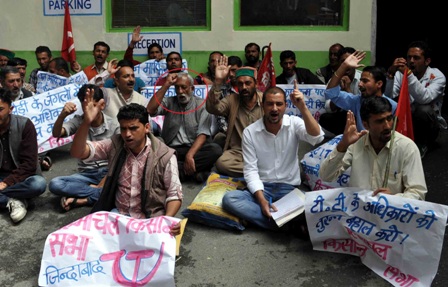Shimla: The Himachal Pradesh High Court acquitted CPI(M) state secretary Rakesh Singha and three others in a criminal case related to labour unrest at the construction site of Natpha Jhakri hydropower project in June 1999 in which two persons had died.
Setting aside the session judge, Kinnaur division court at Rampur’s order of November 30, 2004, Justice Surinder Singh observed that “the evidence is not worth inspiring and is full of contradictions with respect to the roll of the accused persons, in my opinion, none of the accused persons could have been convicted and sentenced.”
“The conviction and sentence passed by the learned trial court against the accused-appellants are hereby set aside,” the judge’s order stated.
The trial court in its 2004 judgment had convicted Rakesh Singha, Hari Om Sharma (since deceased) Kishan Kumar Kashmiri and Bhagat Ram Kaushal and handed out imprisonment sentences for 6 months, one year and two years, to all of them on three separate charges.
The labour unrest was caused at Nathpa Jhakri Joint Venture, a contractor company executing construction of a 11 Km tunnel between Jhakri, Manglahad and Daj Kotla in Sutlej River valley, who laid off a large work force after 90 percent of the job at hand had been completed.

Rakesh Singha and Hari Om happened to be trade union leaders with Singha then being the president of CITU, a union affiliated to the Communist Party of India (Marxists).
Striking workers had stalled work at the project site since February 1999 and the company administration with help from police had failed to persuade the workers to let resume work.
The company management requisitioned services of Loyal Security Forces, Bombay to provide security cover to the workers who wanted to continue with their work.
The prosecution case was that about 40 persons from the Bombay security force requisitioned by the company arrived at Rampur on June 20, 1999 and on June 25, 1999 reached Manglahad project site
At a barrier point workers of the company restrained the security forces from proceeding further and started shouting slogans against them.
One Rajinder Kaushal (not an accused in the case) picked up a stone and on this all workers picked up stones and starting pelting the security personnel, who had to take shelter behind a vehicle.
A gunshot was heard which killed Dev Dutt Bhatt, a worker, and guard Virender Mishra, sustained a head injury. He was later found dead in a nallah.
Prosecution alleged that Rakesh Singh had conducted meetings at CITU office at Kotla on June 17 and 22 to incite the workers that resulted in the violence.
Cross FIRs were registered over the violence that had erupted.
After completion of investigation in both the cases, challans were filed against 14 persons and both cases were tried separately and independently.
In the FIR by workmen, the accused were acquitted whereas it was incumbent upon the trial court to try both the cases together to find out who was the agressor, the judge observed.
Leading the defense team Jagdish Vats argued that Rakesh Singha was not even present at the spot where the incident is said to have taken place.
To frighten the workmen, the company used the services of security guards in collusion with police without valid orders.
The police resorted to lathi charge and the security guards opened gun fire resulting in some workers sustaining pellet injuries and one died, Vats argued.
He let the court know that Singha as president of CITU had been working for the welfare of laourers and in that pursuit was counseling them.
On the other hand the prosecution supporting the impugned judgment of the lower court submitted that Singha was the king pin who instigated the workers to violence.
Holding the labourers as the aggressors, Deputy Advocate General PM Negi argued that security personnel and the police had only tried to defend themselves.
After critical examining of the evidence Justice Surinder Singh observed, “ I find inconsistencies, exaggerations, embellishments and improvements in the statements of the witnesses. If one witness had tried to prove the case, another witness had shattered and contradicted him on material particulars.”
The Judge also noted that “the facts reveal that the security personnel and the police were brought on the spot by the company to suppress the agitation and to compel them to resume work.
The situation appears to have been mishandled by the police which ultimately turned into an ugly incident regarding which the prosecution is not clear as to who was the aggressor.”
Photo: Amit
As Editor, Ravinder Makhaik leads the team of media professionals at Hill Post.
In a career spanning over two decades through all formats of journalism in Electronic, Print and Online Media, he brings with him enough experience to steer this platform. He lives in Shimla.



